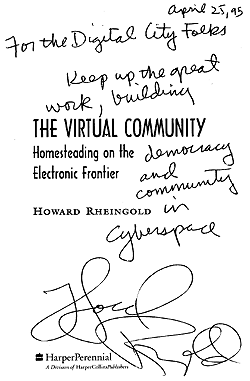About the project
Read the latest article in English: Project "The Digital City Revives. A Case Study of Web Archaeology"
On this site you will find information about the project re:DDS. De Digitale Stad (DDS), the Digital City, was one of the first online community network that operated on an European scale. DDS was founded in the fall of 1993 by 10-15 people (fluid group) and was launched at 15 januari 1994 in Amsterdam. The DDS was inspired by the Community Networks movement in the US and Canada and functioned as a Free-Net in the Netherlands. DDS has attracted international interest for the design it had chosen: it used the metaphor of a city to structure the information and communication in cyberspace and made the users into ‘inhabitants’. Initiatially De Digitale Stad started as a 10 week pilot. In 2001 the virtual city of the DDS was taken offline. The project re:DDS is an attempt to reconstruct the virtual city, the DDS.
Signed copy of 'The Virtual Community' by Howard Rheingold for DDS: 'For the Digital City Folks. Keep up the great work, building democracy and community in cyberspace.'
Goals
De Digitale Stad (DDS), the Digital City, is an unique case study to tell the history of e-culture in Amsterdam. The goals of the project re:DDS are:
- To preserve the internet-historical monument DDS
- To map the history of the DDS, internet and e-culture in Amsterdam
- To include the DDS in the collections of the heritage institutions of Amsterdam
- A pilot for net-archaeology: how to reconstruct, preserve and retrieve the virtual city DDS (DDS is born-digital) and make it accessible to the public, on a scientific and social level.
Web-archaeology
Besides the traditional research techniques (literature, archives and interviews) we practice digital archaeology:
- Digg for content in the Internet Archive and Groups.google.com
- Collect, reboot and restore old servers
- Unpack and activate freezes
- Reconstruct the actual virtual city
- Social web-archaeology: the public is called to participate in digging, collecting and telling their stories
- Face the Pitfalls of Fragile Media (linkrot, lost documents, missing software & hardware).
Planning
The stages of our ‘Information Research & Data Recovery’:
- Launch of the living virtual museum and open history laboratorium: http://hart.amsterdammuseum.nl/re-DDS
- The Grave Diggers Party: Bring Out Your Hardware
- Rise of the Zombies: Finding Lost Bytes: crowdsourcing (technological & social)
- Flight of the Zombies: DDS in ‘multiple points of times’ (reconstruction)
- Enlightenment: Let the Bytes Free!
Made by
Text Contributions: Theun van Doel (researcher, editor, volunteer), Anne-Mirthe Dieudonné (web editor) and Tjarda de Haan.
Technology/reconstruction of the Digital City: Paul Vogel (web-archaeologist, volunteer).
Editor in chief: Tjarda de Haan (web-archaeologist, guest e-curator).
Rights
The content published on this website has been licensed under Creative Commons Attribution-Noncommercial-Share Alike 3.0 Netherlands License (unless otherwise stated). Based on the content as it is published on this website. For obtaining consent with respect to rights not covered under this license contact through M.Oosterbroek(at)amsterdammuseum.nl.
Site visitors who comment on articles must realize that they are not allowed to post content on the site to which they have no rights. By placing the content on the site, visitors give the Amsterdam Museum permission to access this content under the above conditions to license. The Amsterdam Museum promotes discussion on this site but we reserve the right to, without discussion, remove the content if we see immediate cause to do so.
Contact
Mail: T.deHaan(at)amsterdammuseum.nl.
Image
Signed copy of 'The Virtual Community' by Howard Rheingold. Rheingold is the founder of The Well, "the birthplace of the online community movement", and author of the book The Virtual Community. He visited Amsterdam on April 25, 1995 for a demonstration of DDS 3.0 and a discussion meeting at the Balie.
Rheingold reported:
- The Digital City: Community Networking, Netherlands Style
- Virtual Community and Civic Life in Amsterdam
- Watch the recording of the BBC about The Well
